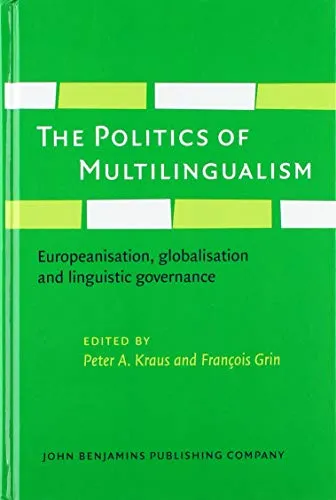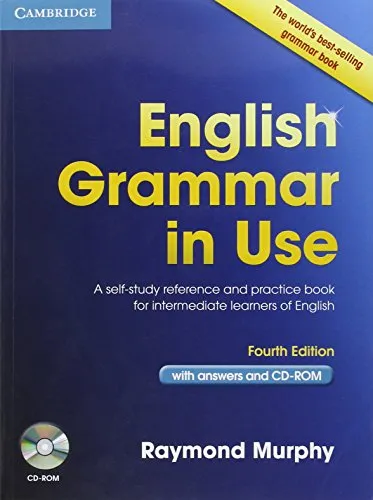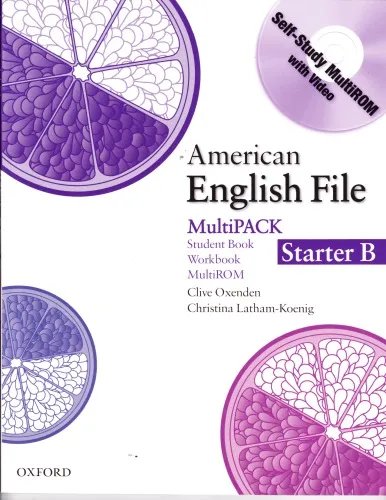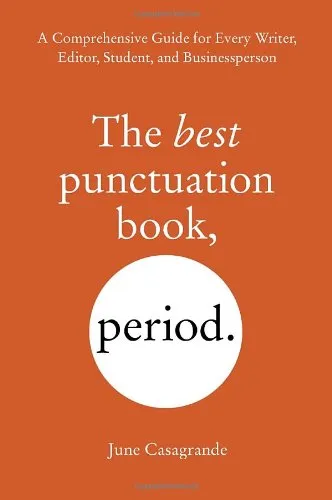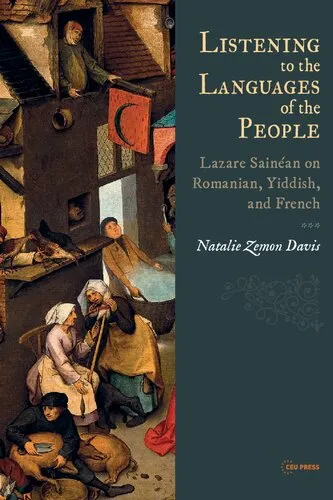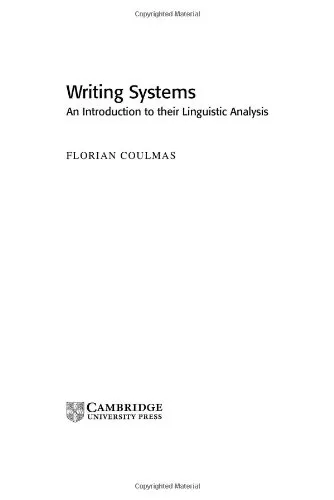The Politics of Multilingualism : Europeanisation, Globalisation and Linguistic Governance
4.5
بر اساس نظر کاربران

شما میتونید سوالاتتون در باره کتاب رو از هوش مصنوعیش بعد از ورود بپرسید
هر دانلود یا پرسش از هوش مصنوعی 2 امتیاز لازم دارد، برای بدست آوردن امتیاز رایگان، به صفحه ی راهنمای امتیازات سر بزنید و یک سری کار ارزشمند انجام بدینکتاب های مرتبط:
معرفی کتاب "The Politics of Multilingualism: Europeanisation, Globalisation and Linguistic Governance"
کتاب The Politics of Multilingualism: Europeanisation, Globalisation and Linguistic Governance اثری جامع است که به بررسی ابعاد سیاسی، فرهنگی و اجتماعی چندزبانگی در دنیای مدرن میپردازد. این کتاب توسط "Peter A. Kraus" و "François Grin" ویرایش شده است و مسائل پیچیده مرتبط با Europeanisation، Globalisation و Linguistic Governance را تجزیه و تحلیل میکند. این اثر از منظرهای مختلف به چالشهای زبانی در سیستمی جهانی نگاه میکند که در آن زبانها نه تنها ابزاری برای ارتباط، بلکه عنصری حیاتی برای هویت، قدرت و سیاست هستند.
خلاصهای دقیق از کتاب
این کتاب در چندین بخش به بررسی موضوعاتی میپردازد که از تنشهای زبانی میان ملتها گرفته تا نقش زبانها در سیاستهای اتحادیه اروپا و تأثیر Globalisation بر سیستمهای زبانی را پوشش میدهد. چندزبانگی، بهویژه در اروپا، بهعنوان موضوعی کانونی در مباحث هویتی و سیاسی ظاهر شده است. Europeanisation، بهعنوان فرآیندی از همگرایی سیاستهای کشورهای اروپایی، هم فرصتهایی را برای تقویت چندزبانگی ارائه کرده و هم چالشهای مرتبط با حفظ زبانهای بومی و اقلیت را نمایان ساخته است.
از طرف دیگر، Globalisation تأثیراتی فراتر از مرزهای اروپا داشته که شامل تحمیل ساختارهای زبانی سلطهگر، تضاد بین زبانهای محلی و جهانی (مانند وضعیت غالب زبان انگلیسی)، و تغییر در Linguistic Governance است. این کتاب به طور متوازن رویکردهای نظری و مطالعههای موردی را ترکیب میکند تا تصویری جامع از این مسائل ارائه دهد.
نکات کلیدی کتاب
- جایگاه زبان در فرآیند Europeanisation و تحولات هویتی کشورهای اروپایی.
- چالشهای مرتبط با Globalisation و تاثیر آن بر زبانهای بومی و سنتی.
- تجزیه و تحلیل Linguistic Governance و نقش سیاستگذاریهای زبانی در جوامع چندزبانه.
- مطالعات موردی از بهرهگیری سیاستهای موفق و ناموفق زبانی در کشورهای مختلف.
نقلقولهای مشهور از کتاب
"Language is not merely a tool for communication but a key asset of identity and political power."
"Europeanisation offers a test bed for understanding the intricate balance between linguistic diversity and political unity."
چرا این کتاب اهمیت دارد؟
کتاب The Politics of Multilingualism برای پژوهشگران، سیاستگذاران، و علاقهمندان به حوزههای زبانی و هویتی بسیار ارزشمند است. در دنیایی که Globalisation مرزهای فرهنگی و زبانی را کمرنگ کرده و زبانها تحت تأثیر نیروهای جهانی قرار گرفتهاند، درک این مسائل ضروریتر از همیشه است. از طرف دیگر، پروژه Europeanisation بهعنوان یکی از بزرگترین تلاشهای تصدیق چندزبانگی و حفظ تنوع زبانی، نشاندهنده آیندهای امیدوارکننده برای سیاستهای زبانمحور است.
این کتاب همچنین دیدگاهی تازه و جامع نسبت به Linguistic Governance و اهمیت آن در مدیریت جوامع چندزبانه ارائه میدهد. نهایتاً، این اثر آموزشی با ترکیب تئوری و مطالعات میدانی به مخاطبان کمک میکند تا مقیاسهای گوناگون سیاست زبانی را در سطح محلی، ملی و بینالمللی درک کنند.
Introduction: The Politics of Multilingualism
“The Politics of Multilingualism: Europeanisation, Globalisation and Linguistic Governance” explores one of the defining features of our contemporary era—language diversity. In this book, editors Peter A. Kraus and François Grin bring together a series of compelling essays to delve into the intricate relationship between multilingualism, governance, and sociopolitical evolution in a rapidly globalising world.
The book focuses on three intersecting domains: Europeanisation, globalisation, and the governance mechanisms shaping multilingual practices in diverse settings. It illustrates how multilingualism is deeply entwined with politics, economics, identity, and power. The chapters provide multidisciplinary perspectives, drawing from sociology, linguistics, policy studies, and political science to illuminate the opportunities and challenges associated with linguistic diversity. Whether examining EU language policy, migration trends, or the commodification of certain languages, this book offers rich theoretical insights and practical frameworks for understanding multilingualism in the 21st century.
Detailed Summary of the Book
At its core, the book interrogates how multilingualism is navigated in both European and global contexts, particularly in the face of sociopolitical tensions and economic interconnectivity.
The discussion begins by situating multilingualism as a political phenomenon. The book explores how language policies are implemented and negotiated within institutions such as the European Union, where official and minority languages must coexist. Chapters in this section reveal the tensions between the drive for unification under a common political framework and the celebration of linguistic and cultural diversity.
The editors then turn their focus to the global stage, where power dynamics favor certain languages over others due to colonial histories and global market forces. English emerges as a dominant force, yet even this dominance brings with it a suite of challenges, such as linguistic inequality and the erosion of lesser-used languages. The book examines how such dynamics influence education systems, labor markets, and migration policies.
Finally, the book pivots to a granular examination of governance practices that attempt to balance linguistic diversity with practical considerations like economic efficiency. By evaluating real-world case studies, it provides insights into how institutions can better manage multilingualism in ways that are just, inclusive, and sustainable.
Key Takeaways
- Multilingualism is not a passive phenomenon but a deeply political issue, influencing governance, cultural identity, and economic systems.
- The European Union provides a fascinating case study on balancing unity and diversity, offering lessons for global linguistic policy frameworks.
- Globalisation and migration trends have transformed language into both a practical resource and a site of inequality, particularly in education and labor markets.
- Languages such as English dominate as global 'lingua franca,' but such dominance comes with cultural and social costs.
- Effective linguistic governance requires innovative approaches that respect diversity while addressing social and economic inequalities among language speakers.
Famous Quotes from the Book
"Language is not only a means of communication; it is a marker of identity and a repository of shared memory—making it a powerful tool in both political unification and division."
"In the age of globalisation, the paradox of multilingualism lies in the simultaneous expansion of linguistic possibilities and the narrowing of linguistic hierarchies."
"Governance in a multilingual world is not simply about managing communication; it is about safeguarding equality, fostering inclusion, and preserving cultural heritage."
Why This Book Matters
This book is essential reading for policymakers, researchers, educators, and anyone interested in the interplay between language and politics.
The age of globalisation and Europeanisation has brought with it unprecedented levels of linguistic connection and conflict. As businesses expand across borders, schools become more multicultural, and migration reshapes urban landscapes, navigating multilingualism has become a central concern for governments and institutions. This book provides a roadmap for understanding how linguistic policies are conceptualised, negotiated, and implemented in different political and social contexts.
By situating multilingualism at the intersection of theory and practice, "The Politics of Multilingualism" contributes to a deeper understanding of one of humanity's most defining and complex traits: language. It challenges simplistic notions of linguistic hegemony and advocates instead for pluralistic, equitable approaches to language governance.
دانلود رایگان مستقیم
شما میتونید سوالاتتون در باره کتاب رو از هوش مصنوعیش بعد از ورود بپرسید
دسترسی به کتابها از طریق پلتفرمهای قانونی و کتابخانههای عمومی نه تنها از حقوق نویسندگان و ناشران حمایت میکند، بلکه به پایداری فرهنگ کتابخوانی نیز کمک میرساند. پیش از دانلود، لحظهای به بررسی این گزینهها فکر کنید.
این کتاب رو در پلتفرم های دیگه ببینید
WorldCat به شما کمک میکنه تا کتاب ها رو در کتابخانه های سراسر دنیا پیدا کنید
امتیازها، نظرات تخصصی و صحبت ها درباره کتاب را در Goodreads ببینید
کتابهای کمیاب یا دست دوم را در AbeBooks پیدا کنید و بخرید
1415
بازدید4.5
امتیاز0
نظر98%
رضایتنظرات:
4.5
بر اساس 0 نظر کاربران
Questions & Answers
Ask questions about this book or help others by answering
No questions yet. Be the first to ask!
